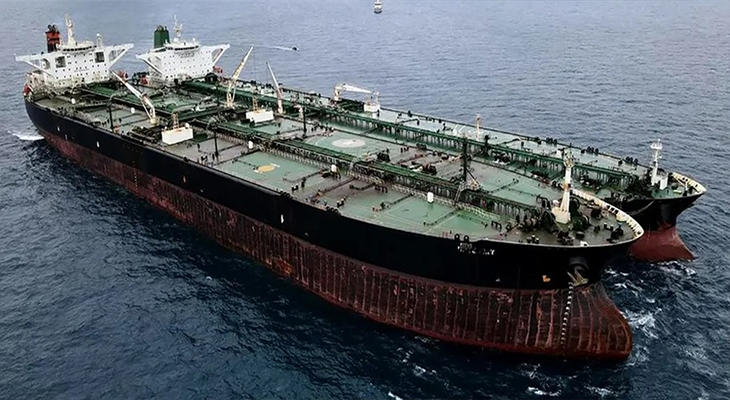On May 27, Iran seized two Greek tankers, named “Prudent Warrior” and “Delta Poseidon”, in the Arabian Gulf. Forces from the Islamic Revolutionary Guard Corps (IRGC) descended on the tankers and ordered them to sail to Bandar Abbas port. Onboard the tankers were 49 crew members. Greece described the operation as ‘piracy’. The seizure seems to be a reprisal for Greece’s role earlier in the month assisting the US impounding a Russian-flagged tanker transporting Iranian oil and carrying 19 crew.
Continuing Tensions
The significance of Iran’s operation is important, summarised in the following:
1. Claiming responsibility:
The IRGC issued a statement claiming the Greek tankers were seized for violations in Gulf waters. The report gave no further details, however, casting doubts regarding the real motives of the seizure.
An earlier statement issued by Iran’s Supreme National Security Council via state-linked media agency “Nur” said Tehran would take ‘punitive actions’ against Greece. The report also said the “proportionate response to the Greek government's action against Iran's interests showed that Tehran will not back down from its red lines in the negotiations and will not retaliate against any hostile action at the international level.”
2. Holding the hard line:
The IRGC carried this tactic previously. In 2019, the crops impounded a British tanker following the seizure of Iran’s “Grace 1” in Gibraltar UK Royal Marines. Two months later, the British tanker left Iran after UK released the Iranian tanker, some reports claiming it was carrying oil to Syria, in defiance of European Union sanctions against Syria. Tehran seems it wants to demonstrate its ability to disrupt traffic through the vital strait.
3. Defying US sanctions:
Iran’s tactic aims to counter American sanctions and curb future seizers of its ships. Thus, Iran’s quick retaliation to Greece who acted on a request by the US Court to transfer the Iranian oil to Washington.
Also, Iran has acted following a new set of sanctions were imposed by the US on a substantial network of what it described as Russian-backed oil smuggling and money laundering network for IRGC’s Quds Force. The US Treasury Department said the network was led by Quds Force figures, “backed by senior levels of the Russian Federation government”. The network helped transfer millions of dollars on behalf of the Quds Force.
4. Challenging US-Israeli escalation:
Recently, Israel has increased its strikes against Iran: the targeting of proxy militias in Syria; assassination of Hassan Sayyad Khodaei, a senior member of the IRGC, who was shot dead in his car in Tehran; the bombing of Parchin military facility south of Tehran by Israeli drones. By seizing the Greek ships, Iran is adamant not to succumb to US and Israeli’s pressure. Iran is sticking to the long-term strategy. For example, Iran responded months later to the Karaj site attack by targeting a commercial ship under Israeli ownership in the Indian Ocean.
The Iranian President Ibrahim Raisi also is concerned with his image. He does not want to come across weak against the US and Israel especially during turbulent unrests in the country. As Iran is subjected to sequential attacks weakens its position at the nuclear negotiation tables with US, and may it find itself having to make concessions which it aims to avoid at any cost.
5. Demonstrate a capacity to escalate:
Two days after the seizure of the ships, the Revolutionary Guard has unveiled two underground bases for attack drones and missiles. The message is loud and clear: Iran is undeterred by Israel’s transgressions. Despite Israel’s attacks on drone bases in February this year, Iran’s capability to manufacture and use these drones in the region is unaffected.
Possible Repercussions
Iran’s move in the region could lead to several outcomes in the region, and beyond, summarised as follows:
1. Slowing nuclear negotiations:
Amidst challenging nuclear deal talks between Iran and the West in Vienna this event diminishes the chances of any real progress in the foreseeable future. As Tehran and Washington negotiators unable to resolve key issues, Europeans as well as Iranian counterparts are becoming increasingly unhopeful of reaching a sustainable agreement.
The Iranian attack certainly further complicates the situation. Tensions are mounting between Iran on the one side and America and Israel on the other, who are cynical of any real change in Iran’s strategy in the region even if a nuclear deal is reached.
2. Threating maritime security:
Iran has implied it could carry out more seizures, threating to target at least 17 other Greek ships in the Gulf, if Athens repeats its bout. Tehran does not seem to be planning on deescalating.
3. Threatening to cooperate with Russia:
Iran’s involvement with the Russian-flagged tankers signifies its willingness to align with Moscow amidst Western sanctions. Iran’s message is it is not only after protecting its own interests, but Russia’s interests as well.
In this context, Iran banks on its strategic relations with Russia as a bargaining chip in its nuclear negotiations with the West. While Iran indicated its willingness to step in for Russia’s sanctioned energy supplies it remained quite open to strengthening its relations with Moscow, especially as nuclear deal talks deteriorated.
To make the message to Washington and the West clear, Deputy Prime Minister Alexander Novak paid a visit to Tehran where he discussed energy trade, infrastructure and logistics solutions between the two countries. Iran’s message is that a failed nuclear deal and increased Western sanctions would only strengthen its relations with Moscow.
In conclusion, the escalating tensions between Iran, Washington and the West would likely to worsen in the coming period. As talks in Vienna break down and the proxy war between Iran and Israel intensifies, negative repercussions would be felt across the region’s security and stability.


